
Gospel text : Matthew 21:33-43
vs.33 Jesus said to the chief priests and the elders of the people:
“Listen to another parable.
There was a man, a landowner, who planted a vineyard; he fenced it round, dug a winepress in it and built a tower; then he leased it to tenants and went abroad.
vs.34 When vintage time drew near he sent his servants to the tenants to collect his produce.
vs.35 But the tenants seized his servants, thrashed one, killed another and stoned a third.
vs.36Next he sent some more servants, this time a larger number, and they dealt with them in the same way.
vs.37Finally, he sent his own son to them. ‘They will respect my son’ he said.
vs.38 But when the tenants saw the son, they said to each other,
‘This is the heir. Come on, let us kill him and take over his inheritance.’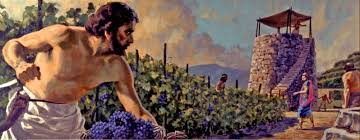
vs.39 So they seized him and threw him out of the vineyard and killed him.
vs.40Now when the owner of the vineyard comes, what will he do to these tenants?”
vs.41 They answered, “He will bring those wretches to a wretched end and lease the vineyard to other tenants who will deliver the produce to him when the season arrives.”
vs.42 Jesus said  to them,
to them,
“Have you never read the scriptures:
‘It was the stone rejected by the builders that became the keystone. This was the Lord’s doing and it is wonderful to see’?
vs.43 I tell you, then, that the kingdom of God will be taken from you and given to a people who will produce its fruit.”
***********************************************************
We have four sets of homily notes to choose from. Please scroll down the page for the desired one.
Michel DeVerteuil : Holy Ghost Priest and Specialist in Lectio Divina
Thomas O’Loughlin: Professor of Hist Theology, Uni of Nottingham,
John Littleton: Director of the Priory Institute, Tallaght, Dublin 24
Donal Neary SJ: Editor of The Sacred Heart Messenger
****************************************
Michel DeVerteuil
Lectio Divina with the Sunday Gospels- Year A
www.columba.ie
General Comments
Today’s passage is complex. Several different strands have been woven into it, all with their own main characters, their own movement and their own atmosphere. In our meditation we need to look at each strand individually and then, if we are so inclined, to see a link between them.
1. It is first of all the story of the “landowner”, deeply grieved at the conduct of his tenants. His story is in four stages:
– he cares lovingly for the vineyard (verse 33a);
– he “leases” it (vs. 33b);
– the tenants reject his messengers (vs. 34-38)
– his angry response (vs. 40-41).
The landowner represents us when we give our all as parents, teachers, church or other community leaders. He also represents the founders of religious orders, social movements or political parties. A time comes when we must all let go of our authority (“go abroad”) and entrust to others the people or causes we have served. The parable reminds us of the shock we experience when we learn that our trust has been betrayed.
The landowner’s final response is told in a very significant way. Jesus invites his audience to finish the story for him, agrees with their verdict (implicitly) and so (also implicitly) invites us to agree with them both. The landowner’s response therefore is the model of what our spiritual tradition has called “righteous anger”.
2. The landowner also represents God so that the parable invites us to enter into God’s feelings when he sees how we human beings treat his precious sons and daughters and his beautiful nature. As always the God of the Bible (Old and New Testaments) is not calm and “detached” as a false spirituality has depicted him – and encouraged us to imitate. “Righteous Anger” is a virtue we often fail to practice, especially in the light of the great crimes of our time: world poverty, racism and sexism, the sexual abuse of minors. Jesus is the person in our lives who invites us to repent of our false “detachment” and enter into the anger of God.
3. Th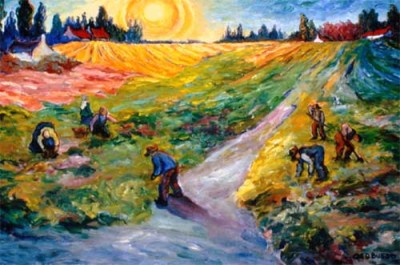 e parable is also the story of the “tenants” and here again we are invited to feel with them. We must however understand their frame of mind correctly. In many cultures today “tenants” are poor people who are harshly treated by their landowners – the historical Jesus would have been on their side. The tenants in the parable are quite different. In the original context (as verse 43 shows) the tenants represent “the chief priests and elders of the people”. Today they represent us to the extent that we belong to an oppressor group – individuals and civilizations – and lose the sense of being stewards of all we possess.
e parable is also the story of the “tenants” and here again we are invited to feel with them. We must however understand their frame of mind correctly. In many cultures today “tenants” are poor people who are harshly treated by their landowners – the historical Jesus would have been on their side. The tenants in the parable are quite different. In the original context (as verse 43 shows) the tenants represent “the chief priests and elders of the people”. Today they represent us to the extent that we belong to an oppressor group – individuals and civilizations – and lose the sense of being stewards of all we possess.
In the parable the “tenants” become angry when they are reminded that the vineyard has been leased to them and they must be accountable for what they have done with it. Their anger grows ever more violent (vs. 35-39). As the story develops, the root of their anger is revealed – they want to own the vineyard! (vs. 38b).
The parable then gives us the key to understanding abuse of authority in its many forms. Its root is always that we feel our higher status being threatened in some way and lash out against the people or events we perceive as threats:
– one of our children rebels or befriends someone we don’t approve of;
– sickness or old age forces us to change our lifestyle;
– a dear friend betrays our trust;
– a project fails which we had put a lot into.
The violence of the tenants in the parable may seem exaggerated on a first reading, but they are a dramatic reminder of the violence which is so much a part of our modern Western culture- against nature, – minorities, – men against women, – adults against children.
In each case it is a matter of “tenants” being angry at being reminded that they are accountable.
The parable reminds us too that the sense of stewardship should be fostered by our religious faith. The fact is however that we religious people, “chief priests and elders of our people,” can forget our dependence on God and no longer thank him for his gifts.
4. The parable is the story of the new tenants – ourselves when we become members of a Church or religious community, a social movement, or political party. We too can become arrogant and complacent. Jesus is the person (or event) reminding us of two humbling realities:
a) we did not earn the right to be where we find ourselves; it was a free gift of God. The lesson is taught imaginatively as always in the bible. We must be as humble as tenants who were hired only because others proved unworthy and the landowner was looking for someone to take their place;
b) we too must produce fruit. A warning must be sounded here: we must be careful not to interpret this as pandering to our culture’s insistence that we human beings prove our worth by being “producers”. That would be a gross misinterpretation of the image. The parable is inviting us to see the potential in all those entrusted to our care and approach them with corresponding reverence. This is of course applicable to our relationship with nature.
5. Finally the parable is the story of the landowner’ son, ill-treated and killed but eventually become the cornerstone of a new era. We “landowners” have been deeply hurt but we do not allow ourselves to despair, we know that if God’s providence triumphs goodness will prevail.
Scripture Reflection
 Lord, we praise and we bless you for your gifts to us:
Lord, we praise and we bless you for your gifts to us:
– our country with its mountains and valleys, its rivers and beaches, its trees and animals;
– our homes and all our possessions;
– our families, children, spouses and parents;
– our friends and spiritual guides;
– our communities in which we work and pray;
– our talents and the education we have received.
– our planet, when did we come to realise that our planet was never an unlimited creation – it too has limits.
Lord, truly you have planted a beautiful vineyard, fenced it round,
dug a winepress in it and built a tower, and then you leased it to us.
We thank you for the privilege of being tenants of your vineyard.
Forgive us, Lord, if we are resentful or angry when we experience our frailty:- ill health or the signs of old age, – failure or ingratitude, – criticism, especially when it is undeserved.
Yet these are your servants that you send to remind us that we are only your tenants in this world, and the season will soon arrive when we will have to hand over the produce to you.
Lord, we thank you that not all tenants are like those in the parable.
We remember with great gratitude those who have loved us
without being possessive – parents, teachers, community leaders.
When the time came they were able to let go, as calmly as any tenant-farmer delivering his produce when the season arrives.
Lord, we thank you for the great prophets of our time:
* church leaders like Archbishop Romero and Dom Helder Camara;
* national leaders like Gandhi and Martin Luther King;
* many others in our countries and villages.
You sent them as your servants to the great ones of the world,
calling them to account for their tenancy.
They were seized and thrashed, some were thrown out of the vineyard and killed.
But you have made them the key-stones of a new age, truly a wonderful thing to see.
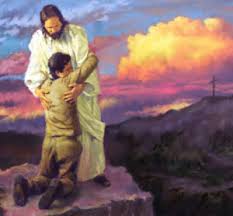 Lord, you have called us to be members of your Church;
Lord, you have called us to be members of your Church;
Forgive us that we so easily become arrogant, as if we have earned the right to membership by our own efforts.
Forgive us that we look on our wealth or the wealth of our country as our own – to do with what we like.
Help us to be humble about our spiritual as well as temporal gifts,
to be like people to whom land has been leased only because others proved unfaithful, and who know that at any moment it can be taken from them just as easily, to be given to others who will produce better fruit.
*********************************************************
Thomas O’Loughlin
Liturgical Resources for the Year of Matthew
www.columba.ie
Introduction to the Celebration
Christ Jesus came among us to invite us to become part of a new people, to gather scattered individuals and transform them into his new community, the kingdom. Let us pause and reflect that we are members of this community, this communion, this body, this priestly people, this kingdom. And, as such, we have now assembled to celebrate with one another and with the Lord.
Homily Notes
1. How do we learn to be Christians? Listen carefully to this question: how do we learn to be Christians? A stock answer might be: ‘What’s with this WE stuff?’
I might want to learn to be a Christian, to find out  what it means to live as a Christian,
what it means to live as a Christian,
I might want to build up the habits of thought and action that would mean my life would have a Christian character, but that is my concern – I do not want others interfering with me, and I do not want to interfere with others! This is not only a possible answer to the question, it is one that is consistent with the dominant social trend in contemporary Western society: we are individual consumers. I take from any heap just what I want, leave the rest; and in everything to do with religion there must be a strict code of non-interference – religion is my own business and no one else’s!
2. The unfortunate thing about the notion of isolated individual unit is that it just does not fit the facts of humanity!
3. First, if we lived consistently on this isolationist model of having a meaningful life we would have to abandon love, the notion of family, the notion of caring for others, and become Robinson Crusoe figures (except that we would not welcome the arrival of man Friday!). Indeed, many who do live lives that are truly individualistic, do find having stable relationships a problem, they fear love as commitment and their first thought about others is that they are potential threats.
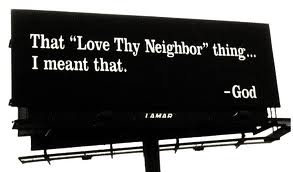 4. Second, Jesus did not come to offer ideas to individuals which they might pick up or reject; rather he came to form a community. This was to be a new type of community that would live with love towards one another, they would view everyone (men/ women; masters / slaves; Jews / Gentiles; rich/ poor; posh people/’not our sort’ people; neighbours/foreigners) in the community as ‘brothers’ and ‘sisters’. This community would be an expression on earth of the love of the Father and the Son in the Spirit; and the love that community would show to others who do not belong to the Christian community would be an expression of the love that God has for all humans. You can only learn to be a Christian by belonging to a Christian community. And you cannot be an isolated individual and be part of a community.
4. Second, Jesus did not come to offer ideas to individuals which they might pick up or reject; rather he came to form a community. This was to be a new type of community that would live with love towards one another, they would view everyone (men/ women; masters / slaves; Jews / Gentiles; rich/ poor; posh people/’not our sort’ people; neighbours/foreigners) in the community as ‘brothers’ and ‘sisters’. This community would be an expression on earth of the love of the Father and the Son in the Spirit; and the love that community would show to others who do not belong to the Christian community would be an expression of the love that God has for all humans. You can only learn to be a Christian by belonging to a Christian community. And you cannot be an isolated individual and be part of a community.
5. You can only learn to be a Christian when you live and collaborate as a Christian with others in a community; then we all learn to be Christians together. We are not always very successful in becoming Christians, and it is difficult to share the life of a community, but that is the only way we will grow as disciples and move along our pilgrimage of faith.
6. So how is this community working together? What are we doing to break down the individualism that keeps us from growing more like Jesus? How are we collectively expressing care and love for the larger society, thereby manifesting the love of God for humanity?
These are painful questions.
* Are poor people being helped by our work?
*Do people caring for the planet know that they have support from us as a group?
* Would people suffering from injustice realise that we will be their allies?
* Would people who are victimised or excluded in our society know that Christians will stand up for them?
* Have we become so individualistic and so consumerist in our attitudes that we imagine we can be Christians and ignore such questions?
7. If we are failing in our answers to these questions, then we are the wretched and corrupt tenants who have rejected God’s servants, the prophets, and; indeed, the Son.
8. We should pause and consider this before we decide to stand and profess our faith.
***********************************************************
John Littleton
Journeying through the Year of Matthew
www.Columba.ie
Gospel Reflection
The gospel parable about the landowner and the tenants of his vineyard is very challenging. On reading it, we may initially be shocked by the disrespect and aggression of the tenants who treated appallingly several messengers from the landowner. Indeed, we are reminded of the cliché: Don’t shoot the messenger just because you don’t like the message!
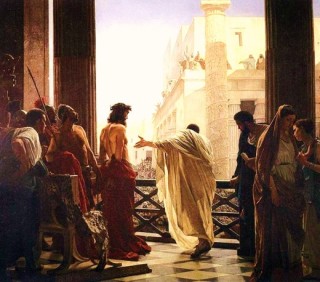
Today, the world many reject Jesus and thereby settle for their own man-made gods.
In addition, we are all aware of instances where a person who is a key person in a team or on a project has been unfairly rejected and unjustly despised by other people. Sometimes rejection happens when those people simply do not understand how necessary and vital the person being rejected is for the success of the team or the completion of the project. However, more often and more sinfully, rejection is the result of jealousy and vindictiveness. We all know such instances from work but, even more so, from sport and politics — locally, nationally and internationally.
The parable advises us about the extent to which some people will go to further their own interests. They will do anything to have their own way. They will compromise their principles. They will blatantly disregard the reputations of friends and colleagues. They will intimidate and frighten them. In their ruthlessness, they will even shoot the messenger because they do not like the message. As many did to Jesus.
Ironically, the messenger is often the only person who can help them or redeem the situation, if only they would have the good sense to recognise this. In the words of the parable: ‘It was the stone rejected by the builders that became the keystone’ (Mt 21:42).
While this is true in our human relationships, it is particularly true in our relationships with God. Frequently, we may reject the challenging message of the gospel. We may despise those who live good and wholesome lives because their goodness is a rebuke to our conscience and we are jealous and resentful. We may fail to realise that when we reject other people and treat them harshly, we do the same to Christ who lives in them and who is their brother.
Likewise, when we reject Christ’s teaching spoken to us by family and others, we also reject Christ speaking to us through them. In rejecting Christ, we reject the eternal life that he has won for us through his suffering, death and resurrection. Christ is the keystone, so often rejected, yet so necessary for our salvation and the salvation of all people. Without Christ we cannot have life with God.
The parable invites us to turn to Christ again. It urges us not to reject Christ in our lives simply because we dislike the challenge of his message. He is the keystone who establishes and maintains our relationships with God.
 Fewer things are more disappointing for any of us than discovering that our efforts and love go unaccepted or unappreciated by others. The same is true about God. Let us, therefore, allow Christ to become and remain the keystone in our lives so that, through us, he may once more become the keystone in the lives of those who have rejected and despised him because they do not accept the challenging but life-giving message of his word.
Fewer things are more disappointing for any of us than discovering that our efforts and love go unaccepted or unappreciated by others. The same is true about God. Let us, therefore, allow Christ to become and remain the keystone in our lives so that, through us, he may once more become the keystone in the lives of those who have rejected and despised him because they do not accept the challenging but life-giving message of his word.
For Meditation
He will bring those wretches to a wicked end
and lease the vineyard to other tenants
who will deliver the produce to him when the season arrives. (Mt 21:41)
*******************************************************************
Fr Donal Neary, S.J
Gospel Reflections for the Year of Matthew
c/f www.messenger.ie/bookshop
The Vineyard is Ourselves!
God is all the time caring for his people and thinking of us, making sure we’re not endangered when he can help it. His care for his people goes into the heart of the Trinity, one of whom becomes one of us, for our sake.
He wants us to bear fruit, as in the second reading. He will give these fruits – and wants us to value them.
In our society today, we could say that in many countries child protection and care is better, We are more inclusive of people who differ from us and the church is open to the whole human family. In Ireland we have more peace now than we had, but maybe not more justice, especially for our migrant people. These are some fruits. We miss out on some issues – the value of faith and community is low and sometimes in public or political life we go for the temporary and the illusory and the dramatic. The gap between rich and poor is wider than ever. We have had bad experiences of greed and financial abuse, even in the charities sector. Our care of the elderly leaves much to be demanded.
Looking at the gospel vision, we can ask how the vineyard is nourished. We find that the cornerstone of the Christian way of life is love, and the love is a person in Jesus. 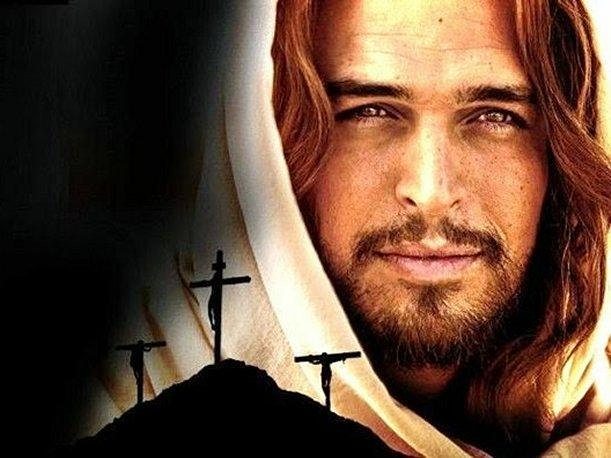 He is the one who will invigorate the vine … Some will ignore him, some will follow. All of us are probably a bit in between. God sent his own Son into the vineyard of human life, not because life is perfect, but because love is. Jesus comes among us because we need him.
He is the one who will invigorate the vine … Some will ignore him, some will follow. All of us are probably a bit in between. God sent his own Son into the vineyard of human life, not because life is perfect, but because love is. Jesus comes among us because we need him.
Imagine a situation where people try to do well
and are prevented. Pray for them.
Lord, may your kingdom come, here and now, today.
**************************************